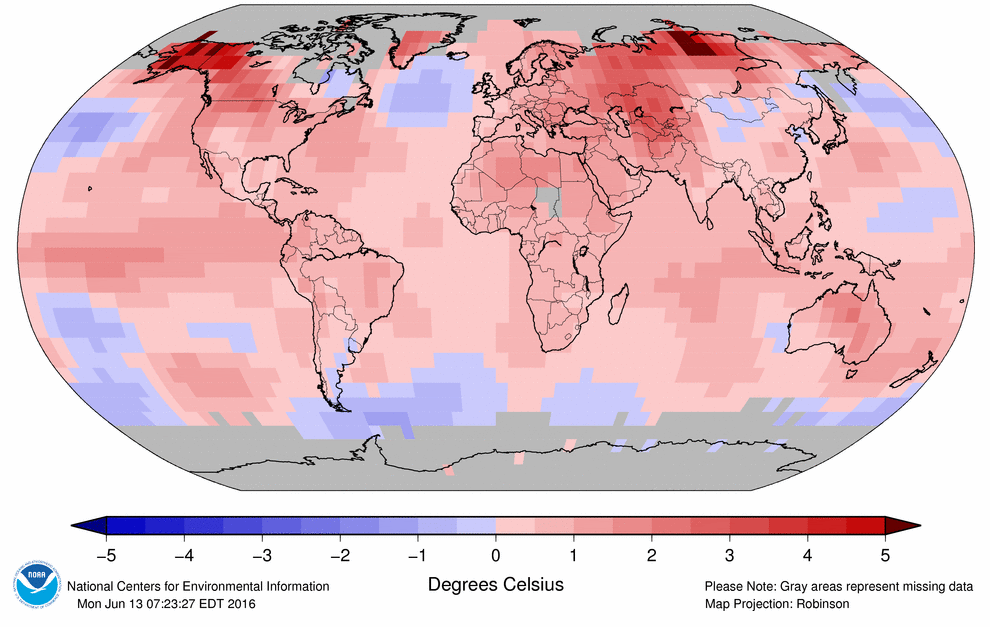
Temperature difference from normal January-May 2016. (NOAA)
It is perhaps the most frustrating response I encounter as a meteorologist when I write about climate change. It stems from doubts about climate change or the view that it’s a political issue, one that shouldn’t contaminate straight weather reporting.
“Stick to the weather,” people say...
But climate change is a scientific reality, and it’s one that is modifying the weather in important ways.
[Links between climate change and extreme weather are increasingly clear and present]
Every meteorologist who is in the business of communicating weather information has an obligation to explain why the weather does what it does, and climate change is playing an ever-increasing role in this story. Ignoring climate change in weather reporting is anti-scientific by omission, and it’s irresponsible.
Considering how temperatures have changed on global, regional and local scales, it is impossible that such changes would not impact the weather.
In a study published in Nature last year, Kevin Trenberth of the National Center for Atmospheric Research and two colleagues argued that all weather now operates in a changed atmosphere and is necessarily altered. “The environment in which all weather events occur is not what it used to be,” they wrote. “All storms, without exception, are different. Even if most of them look just like the ones we used to have, they are not the same.”
On-camera meteorologists who work in politically conservative television markets with significant contingents of climate change doubters have found success in their efforts to educate their audiences about the state of the science.
[Top science groups tell climate change doubters in Congress to knock it off]
Jim Gandy, a TV meteorologist at WLTX in Columbia, S.C., has hosted a series of educational segments branded “Climate Matters,” which has demonstrably improved climate change understanding among his viewers.
“I have been doing it for almost six years and now people consider me an expert on climate change,” Gandy said. “I think our research showed that the subject did not turn people away. In fact, I find people quite interested in how climate change is affecting them and how it will in the future.”
However, despite overwhelming evidence that climate change is impacting weather, George Mason University’s Center for Climate Change Communication found that only “a minority” of television weathercasters “feel very comfortable” presenting climate change information on air. Most say discussing climate change won’t help their careers. Some fear discussing the role of climate change on weather will upset their viewers — or even newsroom management.
But TV weathercasters need to find the courage to communicate about climate change responsibly. The science is on their side.
Greg Fishel, chief meteorologist at WRAL in Raleigh, N.C., shifted from climate change doubter to climate change instructor after a long, self-led education.
“Broadcast meteorologists have the least amount of formal education [on climate change] of all atmospheric scientists,” Fishel told the Capital Weather Gang. “But even though we have the least education, we have most responsibility to educate ourselves so we can educate the public in the right way.”
Despite criticism from some doubters, Fishel said his effort to reach the public on climate change science has been a “net positive.” In communicating to the unconvinced, he stresses existing uncertainties and shows respect for their points of view. “I think there are ways to minimize confrontation,” he said. “Admit that it’s a polarizing issue and be up front about that. Tell your audiences, ‘I want to share with you the very best science I can get my hands on independent of ideology and politics and you can make up your own mind.’ ”
Fishel’s advice is sage since sometimes the lines between weather and climate change are blurry. There’s such a thing as going too far in connecting the dots and appearing agenda-driven. When the connections seem tortured, it can play into the hands of doubters.
[Claim that jet stream crossing equator is ‘climate emergency’ is utter nonsense]
But we cannot back down from the responsibility to put changing weather in a climate context when appropriate.
Connecting the dots makes most sense when new record-setting weather extremes are directionally consistent with climate trends and supported by peer-reviewed studies. How prominently to call attention to the role of climate change is ultimately a judgment call that depends on the clarity of the linkage, how significant the record is, and how large of an impact it has on society. But we’re headed in the direction of having to do it more and more.
To help do something about the climate change and global warming emergency, click here.
Sign up for our free Global Warming Blog by clicking here. (In your email, you will receive critical news, research, and the warning signs for the next global warming disaster.)
To share this blog post: Go to the Share button to the left below.


Be the first to comment
Sign in with